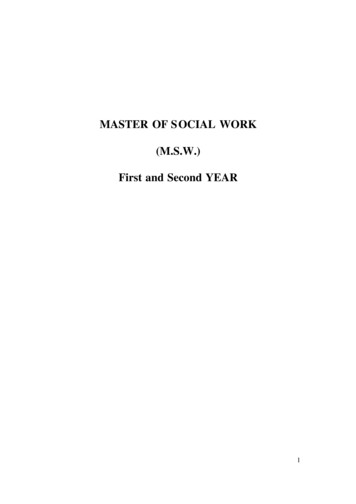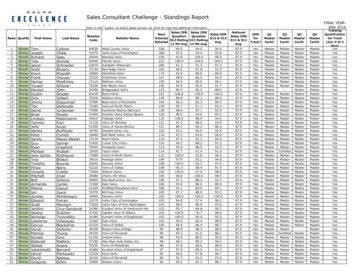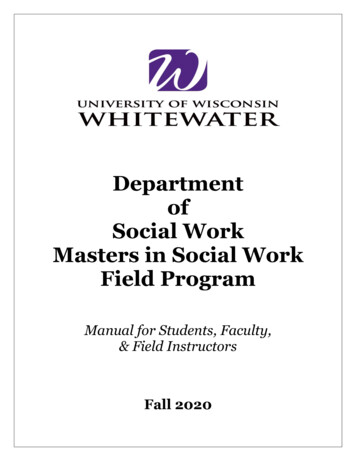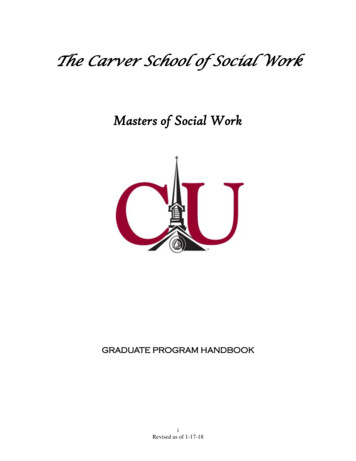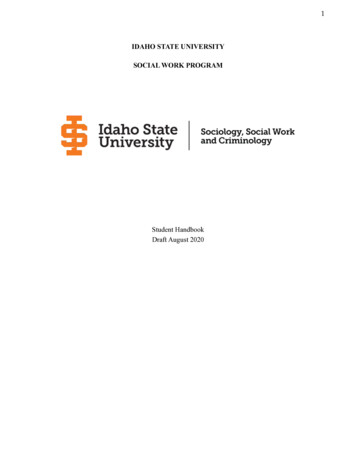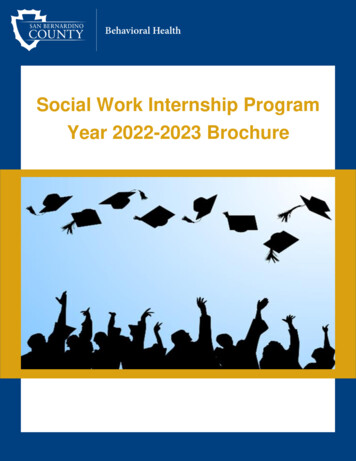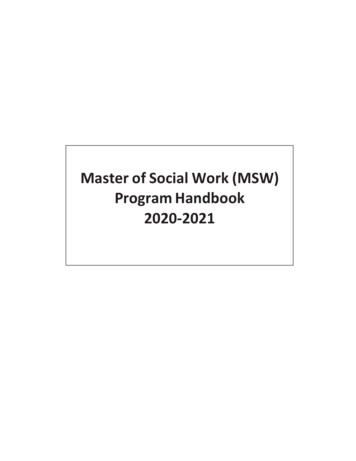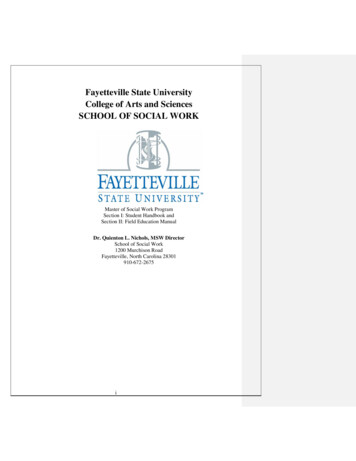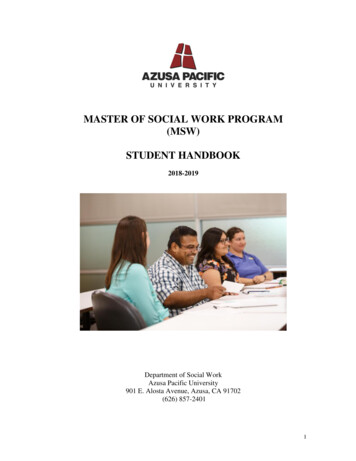
Transcription
MASTER OF SOCIAL WORK PROGRAM(MSW)STUDENT HANDBOOK2018-2019Department of Social WorkAzusa Pacific University901 E. Alosta Avenue, Azusa, CA 91702(626) 857-24011
TABLE OF CONTENTSChecklistMSW Program Full-Time Faculty and StaffUniversity CalendarWelcome from the Program DirectorIntroductionAPU Statement of Mission and PurposeMSW Program Mission StatementMSW Program Definition of Advanced Social Work PracticeMSW Program GoalsMSW Student Learning Outcomes/CompetenciesSocial EquityAffirmative Action and Non-DiscriminationPolicy on Disability/Special NeedsSexual Harassment PolicyChild Abuse Reporting PolicyAdmission to MSW ProgramTechnical StandardsApplication ProcedureAcademic AdvisingProfessional AdvisingTransfer of MSW CreditsTransfer of Elective CreditsIndependent StudyStudent Research OpportunitiesGPA RequirementsMSW Course RequirementsCohort Transfer Request PolicySpecialization Transfer PolicyAttendance PolicyLeave of Absence PolicyCourse DescriptionsMSW Student AssociationStudent Rights and ResponsibilitiesPhi Alpha Honor SocietyField Internship RequirementsAgenciesSocial Work Conduct CodeViolation of the University Academic Integrity PolicyDepartment of Social Work Program Appeal, Probation, and Termination ProceduresAdditional Program RequirementsLicensed Clinical Social Worker (LCSW) ExaminationResourcesAlumniSoul QuestAppendix 1: Graduation Checklist – Community Practice Leadership and Program AdministrationAppendix 2: Graduation Checklist – Clinical Practice with Individuals and FamiliesAppendix 3: University ServicesAppendix 4: Faculty Feedback on Professional ConductAppendix 5: Request for Extended Medical LeaveAppendix 6: Confirmation of Receipt of MSW Handbook; Photo/Video 9293030373838384040414142434344444647485254552
CHECKLIST Read this manual and refer to it in the future. It contains almost everything you needto know about the MSW Program. Go to the New Student Welcome Center at www.apu.edu/welcome/graduate andfollow all steps for class registration, financial aid, buying books, parking permit, IDcard, etc. All MSW students must have an APU email account and check it daily.Any announcements from the MSW Program or from faculty will be sent to thisaccount. Obtain an APU student ID card: http://www.apu.edu/campusauxiliary/onecardoffice. Obtain an APU parking pass at www.apu.thepermitstore.com. Attend the MSW New Student Orientation on August 16, 2018 (5:00-8:30 p.m.) inWynn 2 . Check the status of your financial aid by contacting Terri Franks, Student AccountCounselor, in the Graduate and Professional Center (626) 815-5306. Become familiar with the APU campus (libraries, bookstore, computer labs, WritingCenter, Graphics Center, eating areas, Fitness Center, etc.). Read the APU Graduate Catalog for information on University policies. Search the APU website to learn about the many student services offered.3
MSW PROGRAMFACULTY AND STAFFMary Rawlings, Ph.D., LCSWSocial Work Department ChairProfessor(626) 857-2403mrawlings@apu.eduOffice: Wynn 208FKaren Maynard, MADirector of Student ServicesAssistant Professor(626) 857-2400kmaynard@apu.eduOffice: Wynn 208DDonna Gallup, MSWField FacultyAssistant Professor(626) 815-6000 x 2766dgallup@apu.eduOffice: Wynn 208EAdria Navarro, Ph.D., LCSW (part-time)Assistant Professor(626) 804-2614anavarro@apu.eduOffice: Wynn 9AVirginia Olivas, MSWTitle IV-E CoordinatorAssistant Professor(626) 815-6000 x2720volivas@apu.eduOffice: Wynn 217Olivia Sevilla, Ed.D., LCSWAssistant Professor(626) 815-6000 x2769oesevilla@apu.eduOffice: Wynn 211Jean Un, MSW, LCSWField FacultyAssistant Professor(626) 815-6000 x 2767jun@apu.eduOffice: Wynn 208BRocio Beltran-Dabdoub, BS (part-time)Administrative Assistant(626) 804-2595(626) 815-3861 faxrdabdoub@apu.eduOffice: Wynn 208Kimberly Setterlund, MSW, LCSWMSW Program DirectorAssistant Professor(626) 857-2402ksetterlund@apu.eduOffice: Wynn 208CFroylana Heredia-Miller, MSW, LCSWDirector of Field EducationAssistant Professor(626) 815-6000 x2770fmiller@apu.eduOffice: Wynn 208AMargaret Lee, Ph.D., MSWAssistant Professor(626) 815-6000 x 2718mylee@apu.eduOffice: Wynn 218Shaynah Neshama Bannister, Ph.D., MSWAssociate Professor(626) 815-5000 x2768sneshama@apu.eduOffice: Wynn 209AJennifer Payne, Ph.D., LCSWAssociate Professor(626) 815-6000 x2781jspayne@apu.eduOffice: Wynn 216Regina Trammel, Ph.D., MSWAssistant Professor(626) 815-6000 x2759rtrammel@apu.eduOffice: Wynn 209Lucinda Adam, BAProgram Coordinator(626) 857-2401(626) 815-3861 faxladam@apu.eduOffice: Wynn 2084
CALENDAR 2018-2019DateEventFall 2018July 3August 16August 16August 17August 27 (week of)August 28September 3September 4September 14September 21October 5October 5October 19November 6November 8November 21November 22-25December 10December 14December 21Registration OpensFall Field Instructor Training I (mandatory for all new field instructors)MSW New Student Orientation 5:00-8:30 p.m. Wynn 2Mandatory Field Orientation (for all first year internship students) LAPCField Internships BeginFall Classes BeginHOLIDAY – Labor DayLast Day to Register, Add/Drop Classes or Submit Indep. Study ProposalsFall Field Instructor Training II (mandatory for all new field instructors)Fall Field Instructor Training III (mandatory for all new field instructors)Learning Agreements and Agency Orientation Checklist dueIPE Training Day: Opioid Addiction (1-5 p.m.) UTTC. Required forconcentration year internship students.Mid-Semester Progress Report Due (students in field courses only)Spring Registration OpensLast Day to Withdraw from Classes ( 125 late fee applies, form needed)No classesHOLIDAY – Thanksgiving BreakField Internship Comprehensive Skills Evaluation DueFall Classes EndGraduate Fall Semester Grades DueSpring 2019January 7 (week of)January 8January 11January 21January 14February 23March 1March 4-10March 28April 19April 23April 29May 1May 3May 4May 10Students return to Field InternshipsSpring Classes BeginLast Day to Submit Intent to Graduate form (for May 5, 2019 graduation)HOLIDAY – Martin Luther King Jr. DayLast Day to Register, Add/Drop Classes or Submit Indep. Study ProposalsInterview Preparation Session (mandatory for students entering concentrationyear internship in Fall 2019)Mid-Semester Progress Report Due (students in field courses only)Mid Semester Break (No Classes)Last Day to Withdraw from Classes ( 125 late fee applies, form needed)HOLIDAY – Good Friday (APU closed)Capstone Leadership Showcase (4:30-6:30 p.m.) UTCCField Internship Comprehensive Skills Evaluation and Time Logs DueGraduation Dinner, Hooding, and Awards CeremonySpring Classes and Field Internships EndSpring CommencementGraduate Spring Semester Grades DueNote: Students in Field Internship should refer to the Field Calendar for additional Field Internshiprelated dates.5
WELCOME FROM THE PROGRAM DIRECTORWelcome to the Master of Social Work Program at Azusa Pacific University! The facultyand staff are delighted that you have chosen to pursue a graduate education at APU, in a fieldof practice that is in high demand locally, regionally, and nationally. The MSW degree hasbecome increasingly valuable, as the advocacy needs of the underserved continue to besignificant. To that end, professional social workers are uniquely prepared to address thecomplex needs and challenges in society today.We invite you to maximize your graduate education by individualizing your goals in pursuitof your vocational calling and professional practice interests. From the classroom setting toagency field internships, you will have opportunities to explore career options involvingdiverse settings, populations, and service delivery models. Your professors draw on theirown experiences as practitioners and academic scholars, and they will prepare you toeffectively integrate your knowledge, values, and skills in various social work contexts.While in the program, we also encourage you to participate in the many activities offered bythe MSW Program, such as: MSW Student Association (MSWSA), the student-led socialwork organization; special speaker events; Lobby Days; and service opportunities in andaround our community.This handbook contains information about the MSW Program options, policies, andresources of relevance to current and prospective students. General information about APUgraduate education can also be found in the university’s Graduate Catalog. We hope thesereference materials will be useful and serve to guide your decision-making process while inthe program.On behalf of the MSW Program, we look forward to being a part of your educational journeyas you prepare to become a difference maker in the field of social work!Kimberly Setterlund, MSW, LCSWMSW Program DirectorAssistant Professor6
INTRODUCTIONWe welcome you to the MSW Program and sincerely hope you will have a rewardingexperience at Azusa Pacific University (APU). The MSW curriculum has been designed toprepare you for professional social work by integrating knowledge and skills learned in theclassroom with practical experience gained in the field internship.Social work is a rewarding profession for people who are motivated by a deep sense ofcalling to serve others. You may be drawn to helping children, vulnerable elderly adults,persons with mental illness, communities in crises or poverty, or one of the many otherpopulations in need of assistance from a social worker. Whatever population you desire towork with, the MSW Program will prepare you well by providing you with the knowledgeand skills needed.Please take the time to read this handbook, together with the APU Graduate Catalog(available online) at the APU website. It will help you understand the MSW Program andwhat is expected of you, as a student. You will also learn about the many universityresources available to you. If you have any questions, please do not hesitate to contact me. Ilook forward to working with you and assisting you in any way I can.Karen Maynard, MADirector of Student ServicesAssistant Professor7
AZUSA PACIFIC UNIVERSITY STATEMENT OF MISSION AND PURPOSEAzusa Pacific University is an evangelical Christian community of disciples and scholarswho seek to advance the work of God in the world through academic excellence in liberalarts and professional programs of higher education that encourage students to develop aChristian perspective of truth and life.MSW PROGRAM MISSION STATEMENTThe MSW Program in the Department of Social Work at Azusa Pacific University seeks todevelop competent advanced social work practitioners who can integrate the knowledge,values, and skills of social work to advance social justice and provide services to assistindividuals, families, groups, organizations, and communities. Grounded in the profession’sCode of Ethics and sensitivity to diversity, the MSW Program is committed to excellence inour teaching and scholarship, the integration of faith and learning, the development ofprofessional leadership, and the strengthening of communities in local, national, andinternational contexts.MSW PROGRAM DEFINITION OF ADVANCED SOCIAL WORK PRACTICEThe Program defines advanced practice as the specific set of evidence-based,interdisciplinary knowledge, theories, skills, and analytical abilities necessary to addresscomplex problems at multiple levels with appropriate attention to personal, social, cultural,and environmental influences and resources.MSW PROGRAM GOALSThe following outcome goals are derived from the mission statement and purposes of socialwork education congruent with accreditation standards:1. Graduates will exhibit competence in generalist and advanced social work practicewith diverse individuals, families, groups, organizations, and communities, includingappropriate uses of supervision, consultation, and discernment to seek necessaryorganizational change.2. Graduates will demonstrate knowledge, built on a liberal arts foundation, of thehistory of the social work profession and empirically supported theoreticalframeworks that provide understanding of individual development and behavioracross the life span and interactions among and between individuals and families,groups, organizations, and communities.3. Graduates will demonstrate critical thinking skills, skills related to the effectiveintegration of research in practice and adequate preparation for leadership, advancedstudy, and lifelong learning.8
4. Graduates will demonstrate knowledge and skills to partner with communities toadvocate for the development of policies and programs that seek to advance humanrights and well-being, promote social and economic justice, empower clients, andrespect diversity.5. Graduates will practice according to the values and ethics of the profession andunderstand the ethical integration of Christian faith in practice, including nondiscrimination in the areas of age, class, culture, color, disability, ethnicity, familystructure, gender, marital status, national origin, race, religion, sex, and sexualorientation.6. Faculty will engage in ongoing scholarship reflecting the goals and needs ofprofessional social work practice.Note: Students entering the MSW Program prior to 2016 will complete the program underthe 2008 EPASCOUNCIL ON SOCIAL WORK EDUCATION (CSWE) EDUCATIONAL POLICYAND ACCREDITATION STANDARDS (EPAS) 2015: COMPETENCIES (effectiveFall 2016)Competency 1: Demonstrate Ethical and Professional BehaviorCompetency 2: Engage Diversity and Difference in PracticeCompetency 3: Advance Human Rights and Social, Economic, and Environmental JusticeCompetency 4: Engage in Practice-Informed Research and Research-Informed PracticeCompetency 5: Engage in Policy PracticeCompetency 6: Engage with Individuals, Families, Groups, Organizations, andCommunitiesCompetency 7: Assess Individuals, Families, Groups, Organizations, and CommunitiesCompetency 8: Intervene with Individuals, Families, Groups, Organizations, andCommunitiesCompetency 9: Evaluate Practice with Individuals, Families, Groups, Organizations, andCommunitiesCompetency 10: Demonstrate Ethical Integration of Faith and Spirituality in Social WorkPracticeFoundation Year Competencies and Practice Behaviors (effective Fall 2016, allfoundation courses will be using 2015 EPAS)Competency 1: Demonstrate Ethical and Professional BehaviorSocial workers understand the value base of the profession and its ethical standards, as wellas relevant laws and regulations that may impact practice at the micro, mezzo, and macrolevels. Social workers understand frameworks of ethical decision-making and how to applyprinciples of critical thinking to those frameworks in practice, research, and policy arenas.Social workers recognize personal values and the distinction between personal andprofessional values. They also understand how their personal experiences and affectivereactions influence their professional judgment and behavior. Social workers understand theprofession’s history, its mission, and the roles and responsibilities of the profession. Social9
works also understand the role of other professions when engaged in inter-professionalteams. Social workers recognize the importance of life-long learning and are committed tocontinually updating their skills to ensure they are relevant and effective. Social workers alsounderstand emerging forms of technology and the ethical use of technology in social workpractice. Social workers: make ethical decisions by applying the standards of the NASW Code of Ethics,relevant laws and regulation, models for ethical decision-making, ethical conduct ofresearch, and additional codes of ethics as appropriate to context. use reflection and self-regulation to manage personal values and maintainprofessionalism in practice situations. demonstrates professional demeanor in behavior; appearance; and oral, written, andelectronic communication. use technology ethically and appropriately to facilitate practice outcomes. use supervision and consultation to guide professional judgment and behavior.Competency 2: Engage Diversity and Difference in PracticeSocial workers understand how diversity and difference characterize and shape the humanexperience and are critical to the formation of identity. The dimensions of diversity areunderstood as the intersectionality of multiple factors including but not limited to age, class,color, culture, disability and ability, ethnicity, gender, gender identity and expression,immigration status, marital status, political ideology, race, religion/spirituality, sex, sexualorientation, and tribal sovereign status. Social workers understand that, as a consequence ofdifference, a person’s life experiences may include oppression, poverty, marginalization, andalienation as well as privilege, power, and acclaim. Social workers also understand the formsand mechanisms of oppression and discrimination and recognize the extent to which acultures’ structures and values, including, social, economic, political, and culture exclusions,may recognize the extent to which a culture’s structures and values, including social,economic, political, and cultural exclusions, may oppress, marginalize, alienate or createprivilege and power. Social workers: apply and communicate understanding of the importance of diversity anddifference in shaping the experiences in practice at the micro, mezzo, and macrolevels. present themselves as learners and engage clients and constituencies as experts oftheir own experiences. apply self-awareness and self-regulation to manage the influence of personalbiases and values in working with diverse clients and constituencies.Competency 3: Advance Human Rights and Social, Economic, and EnvironmentalJusticeSocial workers understand that every person regardless of position in society hasfundamental rights such as freedom, safety, privacy, and adequate standard of living, healthcare, and education. Social workers understand the global interconnections of oppression andhuman rights violations, and are knowledgeable about theories of human need and socialjustice and strategies to promote social and economic justice and human rights. Social10
workers understand strategies designed to eliminate oppressive, environmental, economic,social and cultural human rights are protected. Social Workers: apply their understanding of social, economic, and environmental justice to advocatefor human rights at the individual and system levels. engage in practices that advance social, economic, and environmental justice.Competency 4: Engage in Practice – Informed Research and Research-InformedPracticeSocial workers understand quantitative and qualitative research methods and their respectiveroles in advancing a science of social work and in evaluating their practice. Social workersknow the principles of logic, scientific inquiry, and culturally informed and ethicalapproaches to building knowledge. Social workers understand that evidence that informspractice derives from multi-disciplinary sources and multiple ways of knowing. They alsounderstand the process for translating research use practice experience and theory to inform scientific inquiry and research apply critical thinking to engage in analysis of quantitative and qualitative researchmethods and research findings. use and translate research evidence to inform and improve practice, policy, andservice delivery.Competency 5: Engage in Policy PracticeSocial workers understand that human rights and social justice, as well as social welfare andservices, are mediated by policy and its implementation at the federal, state, and local levels.Social workers understand the history and current structure of social policies and services,the role of policy in service deliver, and the role of practice in policy development. Socialworkers understand their role in policy development and implementation within their practicein practice settings at micro, mezzo, and macro levels and they actively engage in policypractice to effect change within those settings. Social workers recognize and understand thehistorical, social, cultural, economic, organizational, environmental, and global influencesthat affect social policy. They are also knowledgeable about policy formulation, analysis,implementation, and evaluation. Social work: identify social policy at the local, state, and federal level that impacts well-being,service delivery, and access to social services. assess how social welfare and economic policies impact the delivery of and access tosocial services. apply critical thinking to analyze, formulate, and advocate for policies that advancehuman rights and social, economic, and environmental justice.Competency 6: Engage with Individuals, Families, Groups, Organizations, andCommunitiesSocial workers understand that engagement is an ongoing component of the dynamic andinteractive process of social work practice with, and on behalf of, diverse individuals,families, groups, organizations, and communities. Social workers value the importance ofhuman relationships. Social workers understand theories of human behavior and the socialenvironment, and critically evaluate and apply this knowledge to facilities engagement withclients and constituencies, including individuals, families, groups, organizations, and11
communities. Social workers understand strategies to engage diverse clients andconstituencies to advance practice effectiveness. Social workers understand how theirpersonal experiences and affective may impact their ability to effectively engage with diverseclients and constituencies. Social workers value principles of relationship-building and interprofessional collaboration to facilitate engagement with clients, constituencies and otherprofessional as appropriate. Social workers: apply knowledge to human behavior and the social environment, person-inenvironment, and other multidisciplinary theoretical frameworks to engage withclients and constituencies. use empathy, reflection, and interpersonal skills to effectively engage diverse clientsand constituencies.Competency 7: Assess Individuals, Families, Groups, Organizations, and CommunitiesSocial workers understand that assessment is an ongoing component of the dynamic andinteractive process of social work practice with and on behalf of, diverse individuals,families, groups, organizations, and communities. Social workers understand theories ofhuman behavior and the social environment, and critically evaluate and apply this knowledgein the assessment of diverse clients and constituencies, including families, groups,organizations, and communities. Social workers understand theories of human behavior andthe social environment, and critically evaluate and apply this knowledge in the assessment ofdiverse clients and constituencies, including individuals, families, groups, organizations, andcommunities. Social workers understand methods of assessment with diverse clients andconstituencies to advance practice effectiveness. Social workers recognize the implications ofthe larger practice context in the assessment process and value the importance ofinterprofessional collaboration in this process. Social workers understand how their personalexperiences and affective reactions may affect their assessment and decision-making. Socialworkers: collect and organize data, and apply critical thinking to interpret information fromclients and constituencies. apply knowledgeable of human behavior and the social environment, person-inenvironment, and other multidisciplinary theoretical frameworks in the analysis ofassessment data from clients and constituencies. develop mutually agreed-on intervention goals and objectives based on the criticalassessment of strengths, needs, and challenges within clients ad constituencies; and select appropriate intervention strategies based on the assessment, researchknowledge, and values and preferences of clients and constituencies.Competency 8: Intervene with Individuals, Families, Groups, Organizations, andCommunitiesSocial workers understand that intervention is an ongoing component of the dynamic andinteractive process of social work practice with, and behalf of, diverse individuals, families,groups, organizations, and communities. Social workers are knowledgeable about evidenceinformed interventions to achieve the goals of clients and constituencies, includingindividuals, families, groups, organizations, and communities. Social workers understandtheories of human behavior and the social environment, and critically evaluate and apply thisknowledge to effectively intervene with clients and constituencies. Social workersunderstand methods of identifying, analyzing, and implementing evidence –informed12
interventions to achieve clients and constituency goals. Social workers value the importanceof interprofessional, and inter-organizational collaboration. Social workers: critically choose and implement interventions to achieve practice goals and enhancecapacities of clients and constituencies. apply knowledgeable of human behavior and the social environment, person-inenvironment, and other multidisciplinary theoretical frameworks in the interventionswith clients and constituencies. use inter-professional collaboration as appropriate to achieve beneficial practiceoutcomes. facilitate effective transitions and endings that advance mutually agreed on goals.Competency 9: Evaluate Practice with Individuals, Families, Groups, Organizations,and CommunitiesSocial workers understand that evaluation is an ongoing component of the dynamic andinteractive process of social work practice with, and on behalf of, diverse individuals,families, groups, organizations and communities. Social workers recognize the importance ofevaluating processes and outcomes to advance practice, policy, and service deliveryeffectiveness. Social workers understand theories of human behavior and the socialenvironment, and critically evaluate and apply this knowledge in evaluating outcomes. Socialworkers understand qualitative and quantitative methods for evaluating outcomes andpractice effectiveness. Social workers: select and use appropriate method for evaluation of outcomes. apply knowledge of human behavior and the social environment, person-inenvironment, and other multidisciplinary theoretical frameworks in the evaluations ofoutcomes. critically analyze, monitor, and evaluate intervention and program processes andoutcomes. apply evaluation findings to improve practice effectiveness at the micro, mezzo, andmacro levels.Competency 10: Demonstrate Ethical Integration of Faith and Spirituality in SocialWork PracticeSocial workers understand the role of spirituality and faith as part of a holistic approach tosocial practice and in understanding human behavior and the social environment. Socialworkers apply ethical principles in the integration of faith in practice, mindful of their ownbeliefs, and impact on the helping relationship. Social workers recognize that faithcommunities are part of the cultural context of individuals, families, and communities, andprovide protective as well as risk factors in the process of change. In this context, socialworkers articulate how Christian beliefs and values can be ethically integrated in professionalsocial work practice. Social workers: demonstrate an understanding of a Christian worldview related to social workpractice. critically analyze how Christian, spiritual, or religious traditions assist or hinder thehelping process. demonstrate understanding of ethical integration of faith and spirituality in socialwork practice. understand the contributions and capacity of faith-based organizations and churchesas resources in the delivery of social services.13
Clinical Specialization Competencies and Practice Behaviors (effective fall 2017 allclinical courses will be using 2015 EPAS)Competency 1: Demonstrate Ethical and Professional BehaviorSocial workers have a deep understanding and commitment to the value base of theprofession, and can conceptualize and apply ethical standards and relevant laws andregulations to complex cases involving diverse populations and emerging technologies.Social workers demonstrate advanced critical thinking skills to examine and incorporate useof best practice frameworks for decision making, including use of supervision. Socialworkers integrate the value base of the profession by reflecting on one’s own biases andvalues while considering interconnected ethical implications of assessment, diagnosis,treatment planning, and intervention. Social workers demonstrate affective regulation inworking with clients while using professional judgment and behaviors, and engage inreflective and reflexive practices. Social workers demonstrate the ability to work ininterprofessional teams, engaging in activities within the role and scope of practice of diversesocial work settings. Social workers are aware of the importance of life-long learning anddemonstrate the ability to adapt to, learn about, and apply emerging forms of practice. Consistently apply and advance NASW principles and code of ethics in ambiguousand complex practice situations. Recognize complex ethical considerations related to technology and practice. Recognize the role and appropriate use of supervision and consultation in ethicaldecision-making.Competency 2: Engage Diversity and Difference in PracticeSocial workers understand how diversity and difference characterize and shape the humanexperience as it applies to clinical practice with individuals, families and groups. Socialworkers can identify the ways that practitioner and client cultural backgrounds and beliefsmay affect clinical social work practice. Social workers are able to recognize and addressstigma, access to care, and quality of care issues relating to diverse client groups byidentifying structures and values that oppress and/or enhance privilege or power. Socialworkers are able to
The MSW Program in the Department of Social Work at Azusa Pacific University seeks to develop competent advanced social work practitioners who can integrate the knowledge, values, and skills of social work to advance social justice and provide services to assist individuals, families, groups, organizations, and communities.
